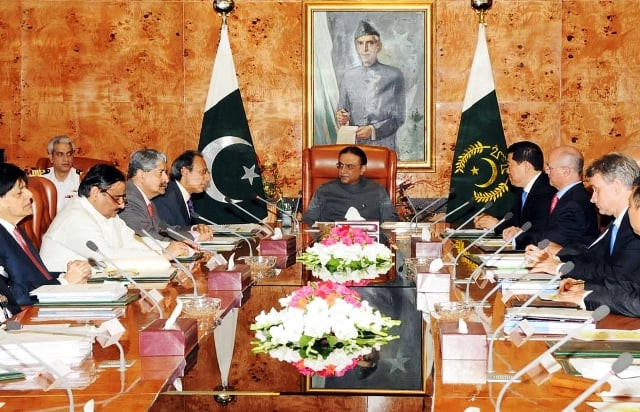Off-balance sheet solutions: Solution to circular debt in sight
ADB proposes creating special mechanism to swap liabilities for cash.

In a rapidly moving development, Pakistan sought funding from the Asian Development Bank on Friday to resolve the financial crisis in the energy sector, a demand that the ADB appears to have acceded to by proposing the creation of a special company that would handle the inter-corporate circular debt.
The request was made earlier on Friday to Xiaoyu Zhao, the vice president of the ADB, who was visiting Islamabad, said sources in the finance ministry. For its part, the ADB appears to have at least tentatively accepted Pakistan’s request and even suggested the broad outlines of a structure that might be used to deliver such financing.
According to finance ministry sources, the ADB has proposed creating a special purpose vehicle (SPV), which would buy up all of the liabilities of every energy company in exchange for cash. The SPV in turn would presumably be funded for this purpose by the ADB. The details of the arrangement have yet to be decided upon.
“If things proceed as planned, it would give up to two years’ breathing space to Pakistan,” said a finance ministry official who attended meetings with the ADB.
The two-year time frame would allow the government time to introduce reforms in the power sector.
On Friday, nine independent power producers have invoked their sovereign guarantees, demanding that the government pay them Rs31 billion. Failure to do so would undermine Pakistan’s already damaged international credit rating (currently B- from Standard and Poor’s).
A five-member cabinet committee, recently created by Prime Minister Yousaf Raza Gilani, has failed to come up with finalised recommendations, mainly due to a personality clash between the members, said sources familiar with the situation.
The finance ministry – inclined towards long-term solutions – had vowed that it would not release any funds to the energy sector without first formulating a permanent solution to the crisis. Yet, the ministry was forced to go back on its stance after it was ordered to release Rs25 billion to energy companies, a violation of the terms of reference of the committee set up by the premier himself.
Sources said that even though the ADB appears to be inclined to finance a solution, it may place several tough conditions on the government, including the privatisation of the state-owned power distribution companies.
President gets involved
On Friday, President Asif Ali Zardari met with the visiting ADB delegation, as well as the World Bank’s country head for Pakistan, Rachid Ben Messaoud. He asked for the help of their respective institutions in funding the $11 billion Diamer Bhasha Dam as well as a transportation network that would connect Pakistan to Central Asia.
Sources said the World Bank agreed to give $2.5 billion for the water and power sector. It agreed to finance the fourth extension project at Tarbela dam.
Published in The Express Tribune, August 27th, 2011.



















COMMENTS
Comments are moderated and generally will be posted if they are on-topic and not abusive.
For more information, please see our Comments FAQ